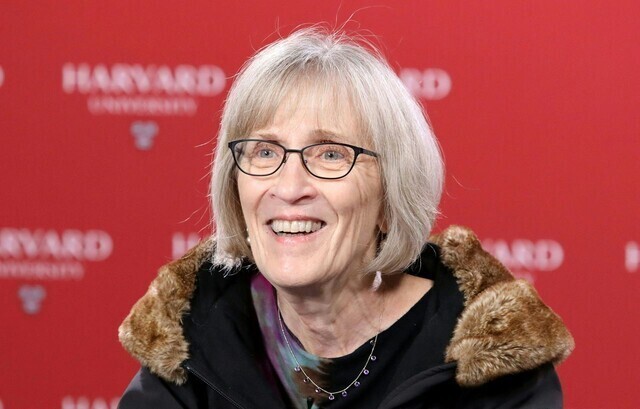hankyoreh
Links to other country sites 다른 나라 사이트 링크
[Reporter’s notebook] Yoon’s gender equality backsliding won’t solve Korea’s low birth rate

After being named the winner of the 2023 Nobel Memorial Prize in Economic Science, Harvard University professor Claudia Goldin mentioned the problem of low birthrates in South Korea during a press conference on Oct. 9, where she commented that the older generation, and especially those who can influence their sons rather than their daughters, should be educated regarding the issue. In essence, she pointed out that a change of attitude is needed within the older generation, men, and corporations in order to solve low birth rates.
Goldin is a labor economist who has been researching changes in women’s labor market participation and the gender wage gap.
In her book “Career and Family,” Goldin points to career disruptions women face due to marriage, childbirth, and child care as the main cause of the gender wage gap, explaining that such career disruptions stem from the commonly held belief that women should be primarily responsible for housework and caregiving. The need for greater awareness regarding gender equality that can help people shirk off gender role stereotypes can be inferred from Goldin’s call for an attitude shift during her press conference.
With a total fertility rate of 0.78 as of last year, South Korea is still not free from gender role stereotypes, falling short of the average total birth rate in OECD countries as of 2021 (1.58). According to a 2021 study on gender equality published by the Ministry of Gender Equality and Family last year, most respondents (68.9%) said housework and caregiving were completely or mostly handled by wives. This was still the case in dual-income families. More than 60% of respondents answered that housework and caregiving were completely or mostly handled by wives.
The gender wage gap in South Korea is like an invulnerable wall. Since joining the OECD in 1996, South Korea has had the widest gender wage gap for 27 consecutive years. As of 2021, the gender wage gap in South Korea was 31%, more than twice the OECD average (12%). South Korea’s glass ceiling index — a composite of 10 indicators regarding higher education, labor participation, and the gender wage gap — has been the lowest out of the OECD for 11 consecutive years.
Structural gender discrimination remains unbudging in all quarters of society, but the Yoon administration continues to disregard this fact. The term “gender equality” doesn’t appear even once in the low birth rate measures that the administration announced last March. This strikes a stark contrast with the first through fourth basic plans for low fertility and population aging put forth by administrations to date, which moved in the direction of expanding gender-equal families, society and culture (Basic Plan 1); expanding a culture and awareness of gender equality across all Koreans (Basic Plan 2); strengthening gender equality education (Basic Plan 3); and a gender-equal and fair society (Basic Plan 4).
For projects aimed at “creating gender-equal organizational culture” that raises gender sensitivity among members of the central and local governments, the Ministry of Gender Equality and Family has cut next year’s budget by 42.3%, from 710 million won to 410 million won. Moreover, as of next year, the ministry has decided to do away with grants for projects that “expand gender equality and women’s social participation,” a program aimed at alleviating the disparities in awareness of gender equality in everyday life. The ministry will also scrap the sexual rights education it has been carrying out for elementary, middle and high school students.
The sexual rights education includes content explaining that divvying up certain work or making decisions based on a person’s gender is called gender stereotyping, and that these stereotypes can become the basis for discrimination. The current administration has chosen to cut back even the educational opportunities that would have an influence on Korea’s sons.
Backsliding on gender equality is completely inconsistent with the “global standards” that the Yoon administration so ardently strives for and the “constitutional values” that it espouses. It’s far past time for things to change.
By Oh Se-jin, staff reporter
Please direct questions or comments to [english@hani.co.kr]

Editorial・opinion
![[Column] Is Korean democracy really regressing? [Column] Is Korean democracy really regressing?](https://flexible.img.hani.co.kr/flexible/normal/500/300/imgdb/original/2024/0705/2917201664129137.jpg) [Column] Is Korean democracy really regressing?
[Column] Is Korean democracy really regressing?![[Column] How tragedy pervades weak links in Korean labor [Column] How tragedy pervades weak links in Korean labor](https://flexible.img.hani.co.kr/flexible/normal/500/300/imgdb/original/2024/0703/8717199957128458.jpg) [Column] How tragedy pervades weak links in Korean labor
[Column] How tragedy pervades weak links in Korean labor- [Column] How opposing war became a far-right policy
- [Editorial] Korea needs to adjust diplomatic course in preparation for a Trump comeback
- [Editorial] Silence won’t save Yoon
- [Column] The miscalculations that started the Korean War mustn’t be repeated
- [Correspondent’s column] China-Europe relations tested once more by EV war
- [Correspondent’s column] Who really created the new ‘axis of evil’?
- [Editorial] Exploiting foreign domestic workers won’t solve Korea’s birth rate problem
- [Column] Kim and Putin’s new world order
Most viewed articles
- 1Real-life heroes of “A Taxi Driver” pass away without having reunited
- 2[Column] Is Korean democracy really regressing?
- 3Former bodyguard’s dark tale of marriage to Samsung royalty
- 4What will a super-weak yen mean for the Korean economy?
- 510 days of torture: Korean mental patient’s restraints only removed after death
- 6Koreans are getting taller, but half of Korean men are now considered obese
- 7S. Korea ranks 7th from bottom in happiness among OECD member states
- 8[Reportage] Inside some of Korea’s 1,067 small towns facing extinction
- 9South Koreans living near border with North unnerved by return of artillery thunder
- 10Beleaguered economy could stymie Japan’s efforts to buoy the yen